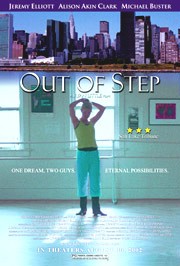|
Out of Step
Be ye not unequally yoked together with unbelievers: for what fellowship hath righteousness with unrighteousness? and what communion hath light with darkness? (2 Corinthians 6:14)
Beware lest any man spoil you through philosophy and vain deceit, after the tradition of men, after the rudiments of the world, and not after Christ. (Colossians 2:8)
 Out of Step tells the story of an LDS Utah girl, Jenny Thomas (Alison Akin Clark), going to study dance at New York University, and all the challenges she has to remain religiously faithful. These challenges are basically twofold: 1) to pursue her "Gentile" boyfriend, David Schrader (Jeremy Elliott), or find eternal love with her LDS friend, Paul Taylor (Michael Buster), and 2) her philosophy class. The former certainly takes precedence throughout the movie, but as a philosopher, the latter is much more interesting. Out of Step tells the story of an LDS Utah girl, Jenny Thomas (Alison Akin Clark), going to study dance at New York University, and all the challenges she has to remain religiously faithful. These challenges are basically twofold: 1) to pursue her "Gentile" boyfriend, David Schrader (Jeremy Elliott), or find eternal love with her LDS friend, Paul Taylor (Michael Buster), and 2) her philosophy class. The former certainly takes precedence throughout the movie, but as a philosopher, the latter is much more interesting.
In one particular class, the professor (David Morgan) gets Jenny among others to come down in front of the class to "prove" their case on why God exists. Of course Jenny gives her "burning in the bosom" defense, and of course that goes over like the heartburn from a bad enchilada. Others give lame defenses as well, but finally the Baptist girl wearing the cross around her neck, Keisha (Nicolle White Robledo), gives a somewhat impressive case for God's existence. And the case she gives actually points to the God of classical theism (Judaism, Christianity, and Islam), not the God of Mormonism (although this correlation isn't brought out in the movie). The need of a Prime Mover for the first event of the universe points to a God beyond time and space, and is quite different from a God who is a product of time and space (Joseph Smith taught that God had to grow up to become a God). Basic, universal moral principles as well as genuine free agency (libertarianism) seem to presuppose a Cause that is outside the order of nature, since these topics are difficult to capture completely in terms of material properties. And this seems to rule out the LDS view (generally held in their circles) of materialism or naturalism.
Later, Keisha has Jenny over to study philosophy. Before Keisha finds out that Jenny is LDS, Keisha tells her that Mormons are cultists, who don't believe in grace and in the true Jesus. After class, Keisha told Jenny how upsetting it is that the class is going to tear down a lot of people's faith. Now Jenny accuses Keisha of a double standard in trying to tear Jenny's faith down. But Keisha explains how it's not just any faith that counts, but the faith that actually saves. She says that her goal is to get people saved, and that Jesus is the only way to heaven. Jenny claims that she believes that too, but Keisha tells her that that can't be from what Keisha's read. But of course Jenny is the authority on what she in fact believes. (This is a typical problem Evangelicals and Mormons have in their dialogues; they don't really understand what each other means by the terms they use. To Keisha, when she says that Jesus is the only way to heaven, she's thinking that there are no other requirements to be in the presence of the Father, for salvation is truly of God's grace, which entails no works on her part [cf. Romans 11:6]. For Jenny, when she says that Jesus is the only way to heaven, she's thinking if it wasn't for Jesus and His sacrifice, none could have the opportunity to go and be with the Father when they die. She's also thinking that Christ allows everyone [with the exception of a small amount of apostates] to go to one of the three heavens or degrees of glory, but if one's going to be with the Father in the Celestial Kingdom, then one must do all that Jesus' Church requires.) Keisha is frazzled and tells Jenny that they'll just have to agree to disagree, and then shows her the door.
After a while Keisha apologizes for the way she acted, and begins to concentrate on being Jenny's friend. Keisha tells Jenny that she'll read whatever book Jenny would like (I wonder if it will be the Book of Mormon?), and Keisha is also able to help counsel Jenny concerning her relationship with David.
Out of Step is a fairly well thought out movie, and a pretty good and entertaining story generally speaking. The interaction with Keisha, as well as Jenny's relationship with David, is dealt with honestly, fairly, and seriously.
Finally, for more reviews and information on Out of Step, click here.
R. M. Sivulka
Vista, CA
July 22, 2004
|